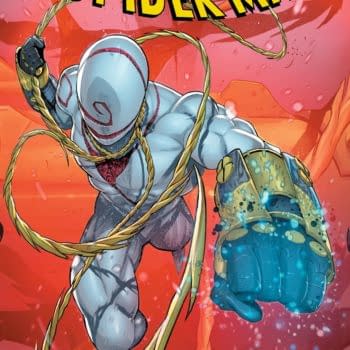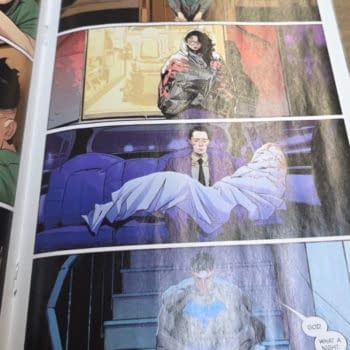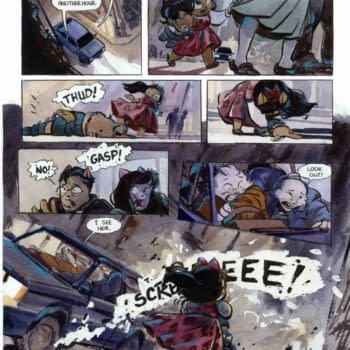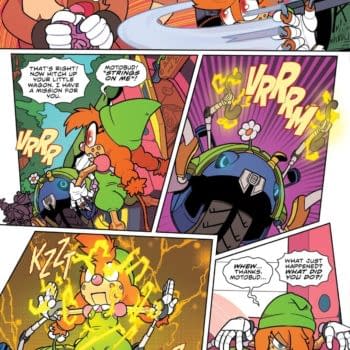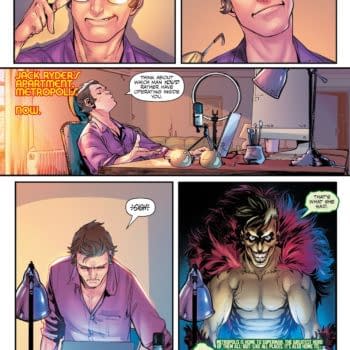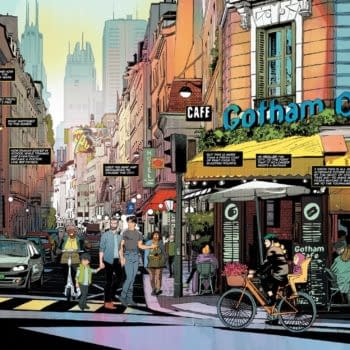Posted in: Comics, Politics, Recent Updates | Tagged: marvel, nick spencer, secret empire
A Primer On Nick Spencer's… Cincinnati Politics
In a widely shared piece on the blog, The Shallow Brigade, writer Kim O'Connor has continued to look at the current reputation Nick Spencer is gaining online as a writer and a social media commentator, and contrasted and compared it with his earlier political career, standing for the Charter Party in Cincinnati local elections in 2005, which she titles "a primer on nick spencer's shitty politics".
It's a subject we'd briefly touched upon a few years ago in an article – and to which Kim O'Connor links – but she did a far better job at bringing up his previous promoted policies and statements at the time.
Reading through it, while I didn't think all of the conclusions matched up, but there was plenty to think about. Especially as Spencer is also painted as someone writing Nazi fantasies in Captain America and Secret Empire, making Steve Rogers a sleeper Hydra agent, no matter what his intent.
I think there is some additional context to bear in mind. 2005 is twelve years ago and a week is a long time in politics. Nick Spencer has moved leftwards in his beliefs since then, and his politics today seem a little bit hawkish but still on the Sanders/Clinton spectrum.
But O'Connor sees that in 2005, " his political platform was rooted in elitism, white fear, and subjugating small-time criminals. The running themes I see now that he's "liberal" are a blind faith in authority, pathological self-involvement, and a weird persecution complex."
She quotes widely from Spencer's 2005 campaign document "Fighting for a Safer Community" in which he underlines his policies to increase the amount of policemen, crack down on drug dealers and increase sentences and prison space.
During which she says that she will pay for this by totally defunding social services. She says "Spencer knew that those 200 new police officers he planned to hire weren't going to come cheap. His idea? Cut social services funding for the city in its entirety" and quotes Spencer's policy "To help pay for these staffing increases ($8.6 million per year)…I will also propose elimination of the Human Services Budget (typically $4 million per year), with the dollars instead going to payroll for safety employees."
She echoes this talking about seeing in Nick Spencer "fascist tendencies in his call to eliminate social services in Cincinnati to fund the rapid expansion of broken-window policing."
Basically, Nick Spencer is Judge Dredd, and painting Cincinnati as Mega-City One.
But here's the thing, Nick Spencer was not calling to eliminate all social services in their entirety. He was calling to eliminate a specific social service that was heavily criticised locally at the time for not allocating resources correctly, desirably or efficiently.
And "broken window policing" was not that controversial a policy at the time and was pursued or accepted by many across the political spectrum. And it seemed a possible solution for Cincinnati, especially the business district, a crime haven at the time.
She also looks at his policy to, ask she says "Displace squatters. Spencer wanted to create (or expand?) a "Blight Team" to root squatters out of buildings" quoting him as saying "We must crack down on absentee landlords who offer safe haven to the criminals terrorizing our streets. … I will work to expand and strengthen City Hall's Blight Team, which is responsible for targeting troubled buildings throughout the city and enforcing building and code violations."
And she identifies a policy she describes one that would "Use eminent domain to relocate homeless shelters and services out of the neighborhood where he lived and worked. Per Cincinnati CityBeat, Spencer's 2005 campaign blog called on the mayor of Cincinnati to use eminent domain against Mary Magdalene House (a homeless shelter) and the Greater Cincinnati Coalition for the Homeless" quoting Spencer as saying "It's time to stop playing around and get tough here. … The city must use all of its powers to protect the civic and financial investments that have been made in the area. The glut of social services that encourage panhandling in the district must be addressed."
Again, without the context that the city at the time was concentrating the homeless into one area in the city rather than spreading services across the city, as a way to gerrymander the votes, but at the expense of helping solve the problem. Nick was proposing a city-wide solution rather than dumping every problematic issue in one district.
She also highlights a number of his statements as racist, characterising black people as drug dealers, as opposed to actual drug dealers. At best it's clumsy language, and the frustrations of a businessman, in a high crime area, possibly using them to target rival club owners. But one example, regarding a mother's concern that police put their hands down her 18 year old's pants to find the crack cocaine supplies he was hiding there seems an entirely appropriate one.
And accusations of a persecution complex, when he has found a bullet hole in his windscreen and, at one point, was under police protection seem stretched. Or his complaints to police about open criminal activities in his business district, including being robbed at gunpoint in his club and police saying that they were stretched, explaining why it took an hour to respond to that call, doesn't seem like paranoia, or some kind of right wing fantasy.
Because what Nick Spencer was fighting for at the time was something called the Collaborative Agreement, that would saw the police working with black community groups and churche, holding themselves accountable to an independent public body investigating police excesses. This was a measure that the Cincinnati police objected to his support for and he was shouted down at a candidates' meeting in a rather conservative area of the city as a result of being the only candidate to hold it.
Charter Committee candidate Nick Spencer defended the "historic" agreement, saying that police-community relations in Westwood are much better than in other parts of the city. Spencer's answer was so unpopular that Westwood Concern co-founder Mary Kuhl told him to sit down. "You use the word 'historic.' Historic for whom? The police?" Kuhl shouted. "At the end of the day, the police ended up being the bad guys."
You can read the full story on how that turned around in years to come, here.
This was the big police/crime issue in the city at the time, with the council very nearly backing out of it. Spencer's support also fought for major reform in use of force reporting, citizen review, and how police interacted with the community.
You can see how the different candidates at the times were compared by the media here, with Nick Spencer described thus;
Opinions on the Cincinnati Police Department run the gamut from Eby's boosterism for under-appreciated cops to Charterite and second-time candidate Nick Spencer's carefully balanced criticism to overt disapproval of current city policing from Lynch and many independent candidates.
Spencer, who co-owns the Over-the-Rhine bar alchemize, pledges that as councilman he'll ride along with police one night each week. No word yet on how police feel about that, though Spencer didn't receive the police union's endorsement.
He did, however, receive the endorsement of Citybeat, the city's left-leaning Village Voice-esque weekly newspaper. Not surprising, the political party he was a member of were pretty much the definition of progressive at the time. And he was a strong supporter and volunteer for the campaign to repeal article 12, an anti-gay law that had been on the books in Cincinnati, and his club hosted the victory party on election night, when everyone expected it to lose. He was quoted here talking about it in 2004, saying,
"There's a split in the Republican party right now, between fiscally conservative East Side Republicans who don't have a big taste or fervor for social issues the way the rest of the party does, especially those on the West Side," said Nick Spencer, a former Republican who founded the young professional group Cincinnati Tomorrow.
The Collaborative issue and Article 12 were the two biggest issues of the time in that city, but he was also a critic of corporate welfare packages for Convergys, and a critic of the city hiring a developer that was looking to create a pretty shifty-sounding entertainment district.
As for Over-The-Rhine area in which his business operated, and to which O'Connor focuses much of her criticism over his attitude, you can read a long history on what happened in the area and what turned it around. Although Nick had moved on, they achieved success by following pretty similar policies to those he had advocated.
Nick Spencer is far from perfect. Especially twelve years ago as a twenty-something-year-old club owner in a heavy crime district that the city seem intent on pouring all their problems into and then forgetting, and who decided to stand for the local council.
But I think accusations of "fascistic tendencies" and promoting "white fear" fall far short of the mark.
Your mileage, of course, may differ. As may your opinion on Secret Empire, punching Nazis and whether or not Nick is an asshole.
EDIT: This piece has been edited to amend Kim O to Kim O'Connor.








